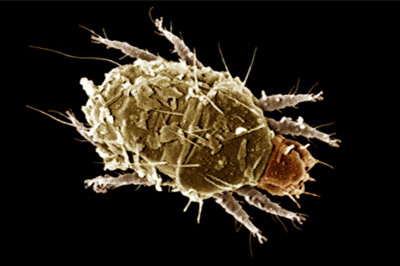Dandruff
 Cheyletiellosis, also called walking dandruff, is a highly contagious skin disease of cats caused by Cheyletiella mites. These mites can also infect dogs and rabbits. These large mites cause excessive flaking of the skin, or dandruff, and their movement on the top layer of skin gives the disease its distinctive name. Cats in direct contact with other cats, such as in shows, shelters and boarding or grooming facilities, are more at risk..
Cheyletiellosis, also called walking dandruff, is a highly contagious skin disease of cats caused by Cheyletiella mites. These mites can also infect dogs and rabbits. These large mites cause excessive flaking of the skin, or dandruff, and their movement on the top layer of skin gives the disease its distinctive name. Cats in direct contact with other cats, such as in shows, shelters and boarding or grooming facilities, are more at risk..
How will cheyletiellosis affect my cat?
Cats infected with the Cheyletiella mite will be covered in the characteristic white dandruff, and are often intensely itchy. This itchiness may also cause cats to exhibit unusual behavioral changes, such as excessive grooming. These mites can frequently cause extreme irritation of the skin, resulting in redness, sores and hair loss, but some cats do not seem to react to the mite by scratching. Other cats may also be carriers of this disease and can be free of visible symptoms.
How do I prevent my cat from getting cheyletiellosis?
Limit your cat’s contact with other cats, and carefully clean all brushes and grooming equipment between cats. The mite can live in the environment for short periods of time, so bedding might also be a source of infection.
Can humans be harmed by cheyletiellosis?
Yes, humans can become infected with this mite species even though people are not the natural host of Cheyletiella mites. Identification of the mite on an infected person will confirm the diagnosis. Mites can cause skin irritation and rashes, but the infestation tends to only last for a few weeks.
For veterinary professionals, more detailed information on Cheyletiella mites can be found at https://www.capcvet.org/guidelines/hairclasping-mite/.
Did you know?
- Cats with flaking, scaly skin, or who groom excessively may have walking dandruff.
- Walking dandruff is caused by Cheyletiella mites..
- Walking dandruff is highly contagious. Keep your cat from cats that may carry it.
- People can be infected by these mites when they come into contact with an infected animal.
Learn More about Specific Parasites
- Overview
- Coccidia
- Dandruff
- Ear Mites
- Fleas
- Heartworms
- Hookworms
- Mange
- Roundworms
- Tapeworms
- Ticks
- Toxoplasmosis
Ask Your Veterinarian
If your cat is suffering from scaling skin or is grooming excessively, your veterinarian can examine it to determine what is causing the problem. If it is walking dandruff, your veterinarian may prescribe a medicated shampoo or other medicine. There are also medicines that can be taken once a month to prevent walking dandruff.